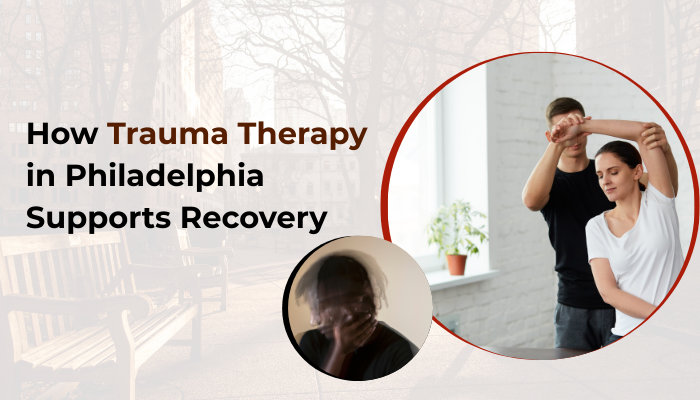Trauma changes lives. But does healing have to remain a distant dream? For many living in Philadelphia, trauma therapy offers a path forward-a way to reclaim peace, rebuild resilience, and restore hope. Trauma therapy isn’t just about talking through pain; it’s about rewiring the brain, understanding emotions, and gradually releasing the grip of past wounds.
Whether you’ve experienced a sudden loss, chronic stress, or deep childhood scars, trauma therapy can make a tangible difference. But what exactly does it involve, and why is it so effective? How does trauma therapy in Philadelphia uniquely support those on the journey to recovery? Let’s explore this deeply important topic together.
Understanding Trauma: More Than Just a Bad Experience
At its core, trauma is an emotional response to a distressing event-or a series of events-that overwhelms a person’s ability to cope. It can stem from:
- Physical or emotional abuse
- Accidents and natural disasters
- War or violence exposure
- Loss of a loved one
- Childhood neglect or abandonment
Yet trauma doesn’t just live in the past. It often hides in the body and mind, triggering flashbacks, anxiety, numbness, and disrupted relationships. Imagine carrying an invisible backpack filled with heavy stones-each step forward weighed down by memories that refuse to fade. Trauma therapy gently helps unpack that burden.
What is Trauma Therapy, and How Does It Work?
Trauma therapy involves specialized techniques designed to help individuals process and heal from traumatic experiences. It’s not a one-size-fits-all approach; rather, it adapts to each person’s needs, pace, and comfort level.
Some common approaches include:
- Cognitive Behavioral Therapy (CBT): Helps identify and change harmful thought patterns related to trauma.
- Eye Movement Desensitization and Reprocessing (EMDR): Uses guided eye movements to reduce the emotional charge of traumatic memories.
- Somatic Experiencing: Focuses on releasing trauma stored in the body through mindful awareness.
- Trauma-Focused Cognitive Behavioral Therapy (TF-CBT): Specifically designed for children and adolescents.
- Narrative Therapy: Encourages patients to rewrite their trauma story with new meaning and empowerment.
The real power of trauma therapy lies in the safe space it creates-where trauma survivors can feel heard without judgment and take back control over their lives.
Why is Trauma Therapy Crucial for Recovery in Philadelphia?
Philadelphia is a city rich with diverse histories and vibrant communities. Unfortunately, many residents face ongoing challenges related to trauma-whether from urban violence, systemic inequities, or personal loss. Trauma therapy in Philadelphia has evolved to meet these unique needs with cultural sensitivity and accessibility.
Some reasons trauma therapy makes a difference in Philadelphia include:
- Community-Centered Care: Many therapists incorporate local context and cultural awareness, making treatment resonate deeply.
- Accessible Services: From nonprofits to private practices, Philadelphia offers a range of options, including sliding scale fees and multilingual counselors.
- Trauma-Informed Schools and Institutions: Schools and organizations increasingly adopt trauma-informed practices, connecting therapy with broader support systems.
- Resilience Building: Trauma therapy in Philadelphia often emphasizes resilience skills that help individuals rebuild community ties and personal strength.
Real-Life Impact: Stories of Healing and Hope
Take Maria, a Philadelphia resident who survived childhood abuse. For years, she suppressed her pain, afraid it would define her. Through trauma therapy, Maria learned to trust again-not only in others but in herself. Using EMDR, she reprocessed painful memories, allowing her anxiety to lessen. Today, Maria works as an advocate, inspiring others to step into healing.
Or consider David, who faced PTSD after witnessing violence in his neighborhood. Trauma therapy helped him shift from survival mode to thriving mode. Somatic Experiencing enabled him to reconnect with his body safely, easing his hypervigilance and sleepless nights.
Stories like these show that trauma therapy isn’t just clinical-it’s profoundly human and transformative.
What to Expect When Starting Trauma Therapy
Starting therapy can be intimidating. Here’s what you might anticipate:
- Initial Assessment: Your therapist will listen to your story and explore symptoms, goals, and preferences.
- Establishing Safety: Building trust and safety is the foundation before diving into deep trauma work.
- Personalized Treatment Plan: Therapy types and intensity are tailored to what suits you best.
- Therapeutic Relationship: Consistency and openness help develop a connection essential for healing.
- Pacing: Healing isn’t linear. Expect good days and tough days; therapy adjusts accordingly.
Practical Tips for Making Trauma Therapy Work for You
- Be patient with yourself. Healing takes time-there are no shortcuts.
- Communicate openly. Let your therapist know what works and what feels challenging.
- Set realistic goals. Even small progress is progress.
- Explore support outside therapy. Peer groups, mindfulness, and creative outlets can complement therapy.
- Watch for trauma triggers. Understanding them empowers self-care.
How Trauma Therapy Supports Long-Term Recovery
The goal isn’t just to survive but to thrive. Trauma therapy supports long-term recovery by:
- Improving emotional regulation and coping skills
- Rebuilding relationships and social trust
- Reducing symptoms like PTSD, anxiety, and depression
- Enhancing self-esteem and empowerment
- Fostering hope for a brighter future
Philadelphia’s mental health professionals emphasize holistic care-addressing mind, body, and community connection-to sustain healing beyond the therapy room.
Closing
Trauma therapy offers a beacon of hope for those burdened by past wounds. It’s about reclaiming your story, step by step, in a supportive space grounded in trust and expertise. If you or someone you care about struggles with trauma, consider reaching out to local providers experienced in trauma therapy in Philadelphia.
Remember, healing isn’t about forgetting-it’s about transforming pain into strength. With dedicated therapists by your side, recovery is not only possible-it’s within reach.
Click – styloact.com


